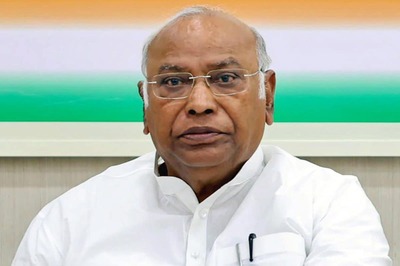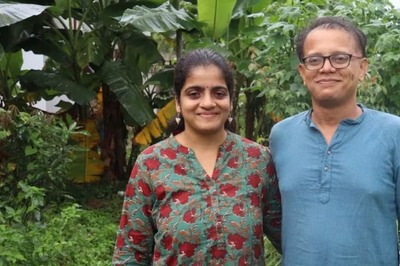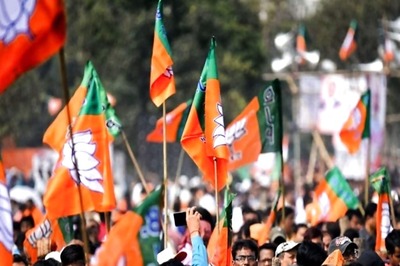
views
Anna Hazare is not every Indian's flavour of the month. Many question his tactics and strategy of battling the government version of the Lokpal Bill. All ordinary Indians do not endorse the way in which he and his colleagues are carrying on the movement for corruption free India.
On its side the government's and Congress party's leadership has tried hard to impress upon people that the Jan Lokpal Bill, the version of the bill put forward by Anna Hazare and his colleagues is one legal framework against stopping corruption while the Government Lokpal Bill is another framework. The government has tried to impress upon all that there is scope of civil society actors to come forward to the Parliament's standing committee and express their opinions on the government's version of the Lokpal Bill.
One minister has even tried to hint that Anna Hazare is being 'undemocratic' that he wants only his version of the bill to be made a law. If one were to extrapolate from the minister's remarks, it would seem that one man was standing against the collective wisdom of the Indian Parliament to defend the rights of India's billion plus people. If one were to go by the minister's proposed thought chain, then one would dub Anna Hazare to be autocratic.
The irony is that even though the minister shows in a 'technical' way the 'undemocratic' nature of Anna Hazare's demand for adoption of the Jan Lokpal Bill, the democratic groundswell for Anna Hazare has increased by the day. And the government's own undemocratic attitude to not let the activist fast at the venue and time of his choice has fuelled the popular support for his movement.
But why are ordinary Indians feeling attracted to Anna Hazare's movement? Have they compared the two versions of the bill, the Lokpal Bill of the government and the Jan Lokpal Bill of Anna Hazare and his colleagues? Most have not. Then why are they showing solidarity for Anna's movement? Though they have not read either of the versions – the government's or the civil society's, they have witnessed how a callous and corrupt government has let scam after scam happen – Commonwealth Games, Adarsh Society in Mumbai, the telecom scam and more getting unearthed week by week.
In Karnataka, the mining scam has been exposed and in UP, the scam in rural health mission has been exposed. On a day to day level, the ordinary citizen is harassed for small services by staff at various government run offices. From the top echelons of India's government in Delhi to the state capitals and up to the local functionaries, people feel that whoever has power, a great number of them misuse power for money and other benefits. It is this perception which has built up over several decades.
All parties are seen to be corrupt. The Congress, the breakaway parties of Congress, the BJP, the communist parties, the social justice parties of DMK, BSP or RJD – all seem to be indulging in corruption and promoting corruption. The entire spectrum of India's political parties seems to be steeped in corruption. Even there are allegations that the Maoists indulge in extortion. Does that mean people think each and every politician is corrupt?
No, they are wise enough to see that there are honest people too in political parties. But they feel that the overarching ethos of organized politics has become one of big money and power. The groundswell of people's support for Anna Hazare is an expression of their fatigue of and anger with the big money and power nexus.
The nexus of ill-gotten big money, political power and non-transparent and bureaucracy is what rules Indian society. This has been so for the last four decades or even more. Billion plus Indians are now revolting against this. They are not raising a voice for Jan Lokpal Bill per se, their voice is against the political muscle power and the power of big money that is strangling their lives.
Added to the already existing big business-political party-bureaucracy nexus has developed the new culture of conspicuous consumption of less than ten per cent of the society. The lifestyles of the rich are being flaunted everywhere. Manmohan Singh's reforms whose ideational basis has been accepted by all major political formations in India that function within Parliament, has created a rich India and an increasingly pauperizing India.
Lack of educational and health facilities, rising income disparities and fast rising costs of living have made the average lower middle class Indian housewife and the middle class student disillusioned with Parliament, political parties and reforms. People see that politicians are all talk for 90 per cent and make more money for 10 per cent. It is this frustration and anger that is spilling over into India's streets. The surge for democracy that happened in the Arab world, the lootings that happened in London are waiting to happen in India.
If the parties do not shake up from their feudal and neo-liberal capitalist slumber, then Indian polity may not even last beyond two decades. The India we know since 1947 may become a political caricature of the past. The likes of Manmohan Singh and his 'wise' economic advisers have taken India on a dangerous path and if the slide is not stopped immediately and pro-people good governance-oriented and decentralized reforms are not initiated in the next two years, we will see not a million but a billion mutinies in India.
Manmohanomics will only push India's poor and disillusioned into the fold of the Maoists. The challenge for India in its 65th year of Independence is really a choice between Gandhi and Mao. Will we explore decentralized anti-elitist India where GDP growth is not touted as the mega-mantra or shall we pursue the blind neo-liberal diktats of a few myopic economist Brahmins and hand over the polity to chaos and a totalitarian ideology of one kind or another?
The popular surge for Anna Hazare needs to be read between the lines and the call for a people's India as opposed to a politician's India needs to be actualized. That is the task for India's people and its panchayats, its assemblies, no less its Parliament, in the next decade.
(The author is convenor of Forum for Peace and Democracy, a Calcutta based group campaigning for democratic reforms and against political violence. His e-mail is [email protected])




















Comments
0 comment